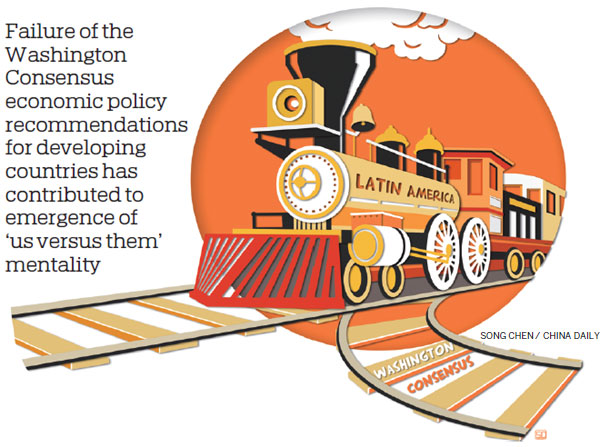Why Latin American populism is on the rise
Populism is characterized by its condemnation of established institutions and its appeals to the common people. Populists believe that society is fundamentally divided into two contradicting groups: the pure people and the corrupt elites. They hold the view that politics ought to be the expression of common people's wishes. Therefore, populism is comprised of three core concepts: the people, the elites and common wishes.
The absence of core values renders populism a chameleonic character that allows it to cater to different political stances, be it left-wing or right-wing, progressive or conservative, democratic or autocratic. In the 21st century, European populism often attaches itself to nationalism, while Latin American populism tends to associate itself with socialism.
In fact, a considerable part of the world's population has some kind of populist mentality. Many believe that the power-controlling elites are dishonest, self-serving, engaged in closed-door deals and indifferent to the interests and opinions of the majority. So, it is the view of many that the people, not politicians, should make the most important decisions and sovereignty shall be given to the people. As has been seen this dormant mentality can be activated in certain conditions.

What kind of factors can contribute to the rise of latent populist sentiments? In 21st century Latin America, several factors are more prominent than others.
First, traditional political forces or parties tend to draw close to the middle, choose to maintain the status quo and try to avoid electorates' major social concerns, in Latin America's case, wealth inequality and poverty issues.
It leaves room for the rise of new-type political parties and politicians who come up with radical solutions to the issues intentionally neglected by traditional parties. For example, due to serious social inequality, populists won huge support in elections with their proposition of improving income distribution.
Once they are in power, they tend to implement expansionary fiscal policy to hold onto power by enlarging distribution. Even though this kind of policy may lead to severe fiscal deficits, inflation and economic difficulty, they will not hold back.
Second, people's growing discontent with the social hierarchy and economic situation contributes to the surge of populists. That's why populism often surfaces with economic difficulties.
In Latin America, a debt crisis since the 1980s has triggered a readjustment of neoliberalism. One consequence of this has been an expanded informal economy, laid-off state employees and weakened workers' unions. Against this backdrop, populist ideology serves as a tool mobilizing the public to turn against the existing system.
Third, there is a "demonstration effect", in that populism is also a contagious phenomenon. Seen from popular psychology, one country can acquire certain sentiments or guides to action from the experience of other countries, their neighbors in particular.
The rapid development of mass media has boosted this demonstration effect. Western scholars have proposed the concept of cognitive mobilization, which means that mass media has made it possible for the public to get access to more information, think more independently and gain more self-awareness. In this way, they will no longer accept the fate of being controlled by the elites, and become more critical of the faults of the ruling party.
Last, the rise of populism is affected by people's anti-globalization sentiments. Populists always tend to construct the concept of people from the perspective of a nation state, in other words, to build a political community of people with shared history and confined boundaries. People are often described as a whole, meaning designated people living in a designated region. In this sense, internationalism and cosmopolitanism are sworn enemies of populism.
Populists are timid toward the people who are excluded from their designated "we" group. That's why populism often goes hand in hand with ethnic nationalism and isolationism in diplomacy.
When making the distinction between "we" and "they", populists often put global institutions and foreign forces into the "they" basket. To some degree, blaming foreign forces can be seen as a simplification of real issues. In fact, there are multiple reasons behind the economic recession and social instability, but populists tend to blame all the fault on foreign forces and fall back on chauvinistic sentiments.
One feature of 21st century Latin American populism is its attack on neoliberalism, and in particular the International Monetary Fund, the World Bank and the United States. They are depicted as evil external forces, who impose their economic policies on Latin Americans against their will, and expand capitalism across the globe at the expense of poor people. Therefore, Latin American populism rises in synchronization with the fall of the Washington Consensus, and tries to depict a new kind of post-neoliberalism political parties and politicians.
The author is professor of Department of History, Peking University. The author contributed this article to China Watch, a think tank powered by China Daily. The views do not necessarily reflect those of China Daily.
(China Daily 01/23/2019 page13)


















